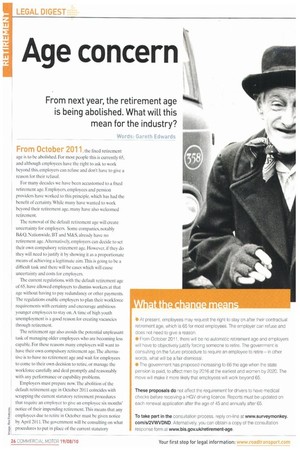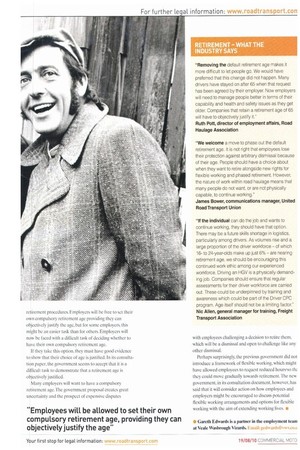1 , LEGAL DIGEST
Page 26

Page 27

If you've noticed an error in this article please click here to report it so we can fix it.
Age concern'
From next year, the retirement age 1111%ft is being abolished. What will this mean for the industry?
Words: Gareth Edwards
From October 2011. the fixed retirement age is to be abolished. For most people this is currently 65, and although employees have the right to ask to work beyond this, employers can refuse and don't have to give a reason for their refusal.
For many decades we have been accustomed to a fixed retirement age. Employers, employees and pension providers have worked to this principle, which has had the benefit of certainty. While many have wanted to work beyond their retirement age, many have also welcomed retirement.
The removal of the default retirement age will create uncertainty for employers. Some companies, notably B&Q, Nationwide, BT and M&S. already have no retirement age. Alternatively, employers can decide to set their own compulsory retirement age. However, if they do they will need to justify it by showing it as a proportionate means of achieving a legitimate aim.This is going to he a difficult task and there will be cases which will cause uncertainty and costs for employers.
The current regulations. with the default retirement age of 65, have allowed employers to dismiss workers at that age without having to pay redundancy or other payments. The regulations enable employers to plan their workforce requirements with certainty and encourage ambitious younger employees to stay on. A time of high youth unemployment is a good reason for creating vacancies through retirement.
The retirement age also avoids the potential unpleasant task of managing older employees who are becoming less capable. For these reasons many employers will want to have their own compulsory retirement age. The alternative is to have no retirement age and wait for employees to come to their own decision to retire. or manage the workforce carefully and deal promptly and reasonably with any performance or capability problems.
Employers must prepare now.'lle abolition of the default retirement age in October 2011 coincides with scrapping the current statutory retirement procedures that require an employer to give an employee six months' notice of their impending retirement. This means that any employees due to retire in October must be given notice by April 2011. The government will be consulting on what procedures to put in place of the current statutory
retirement procedures. Employers will be free to set their own compulsory retirement age providing they can objectively justify the age, but for some employers, this might be an easier task than for others. Employers will now be faced with a difficult task of deciding whether to have their own compulsory retirement age.
If they take this option. they must have good evidence to show that their choice of age is justified. In its consultation paper, the government seems to accept that it is a difficult task to demonstrate that a retirement age is objectively justified.
Many employers will want to have a compulsory retirement age. The government proposal creates great uncertainty and the prospect of expensive disputes




























































































































